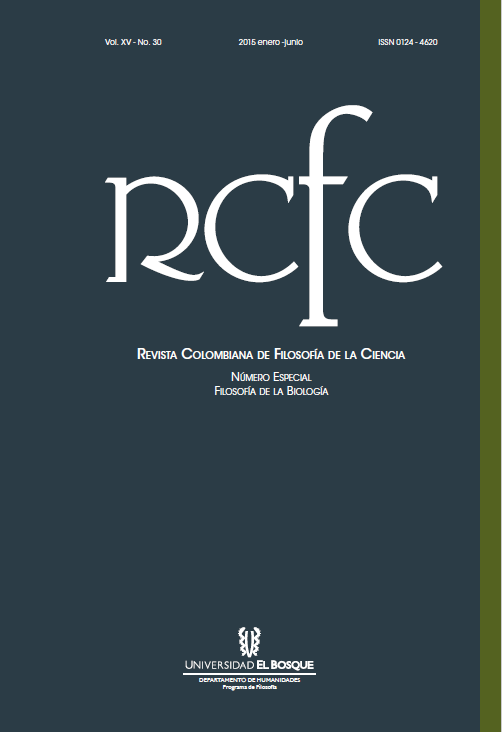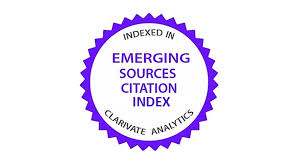Las explicaciones sobre el comportamiento social: entre la administración y la generación de beneficio
DOI:
https://doi.org/10.18270/rcfc.v15i30.1651Abstract
El estudio de la evolución del comportamiento social, principalmente en términos de cooperación y altruismo, ha estado marcado por una proliferación de explicaciones y modelos teóricos. El desarrollo de modelos matemáticos formales ha desempeñado un papel fundamental en esta dirección, dado que pretenden capturar las relaciones de dependencia entre ciertos factores clave, como el parentesco, la tasa de migración y el mantenimiento de las interacciones cooperativas en una población (e.g. Hamilton 1964; Trivers 1971; Axelrod & Hamilton 1981; Boyd & Richerson, 1985; entre otros). Estos modelos formales se centran en la distribución del beneficio que se desprende de las interacciones entre agentes y son muy apreciados dado que presentan un amplio margen de generalización, la cual descansa en su capacidad de abstraer datos a partir del comportamiento de los interactores. Sin embargo, un asunto cada vez más evidente es que dichos modelos dejan de lado las interacciones mismas y se concentran en el análisis del costo sobre la aptitud y los pagos que entrañan para los individuos sus acciones. Con ello se explica cómo se distribuye el beneficio pero se deja fuera un aspecto crucial: cómo es que aquel se genera. En un intento por superar estas limitaciones en este artículo defendemos, siguiendo a Calcott (2008), la necesidad de crear modelos que incluyan la forma en que se organiza la acción colectiva, centrando la atención en la generación de beneficio. Este texto proporciona un panorama sobre dicha discusión y sus repercusiones en la compresión del comportamiento social.
Downloads
References
Axelrod, Robert. The Evolution of Cooperation. New York: Basic Books. 1984.
Axelrod, Robert & Hamilton, William. “The Evolution of Cooperation”.
Science. 211 (1981): 1390-1396.
Benjamin, Allen & Nowak, Martin. “Cooperation and the Fate of Microbial
Societies”. Journal of biology 11. 4 (2013): e1001549.
Boyd, Richard., Gintis, Herbert., Bowles, Samuel., & Richerson Peter. “The
evolution of altruistic punishment”. National Academy of Sciences of the
United States of America, 100.6, (2003): 3531-3535.
Boyd, Robert & Richerson, Peter. Culture and the evolutionary process.
Chicago: University of Chicago Press. 1985.
Brosnan, Sarah., & de Waal, Frans. “Una respuesta sencilla para el trueque en
los chimpancés (Pan troglodytes)”. Primates 46 (2005): 173-182.
Calcott, Brett & Sterelny, Kim. The Major Transitions in Evolution Revisited,
USA: MIT Press, 2011.
Calcott, Brett. Transitions in Biological Organization. Tesis para optar al título
de Doctor en filosofía de la Australian National University. 2006.
_____.The other cooperation problem: Generating benefit. Biology and Philosophy.
, (2008): 179-203.
Carranza, Juan. Etología: introducción a la ciencia del comportamiento. España.
Universidad Extremadura, 1997.
Clayton, Nicola., Emery, Nathan., & Dickinson, Anthony. “The rationality
of animal memory: Complex caching strategies of western scrub” (pp.
-216), en S. Hurley y M. Nudds (Eds.), Rational Animals? New York:
Oxford University Press, 2006.
Clutton-Brock Timoteo. “Breeding together: kin selection, reciprocity and
mutualism in cooperative animal societies”. Science 296 (2002): 69–72.
Darwin, Charles. El origen de las especies por medio de la selección natural. México: Universidad Nacional Autónoma de México, Academia Mexicana de Ciencia, 1859/2009.
Dawkins, Richard., & Krebs, John. (1978). “Animal signals: information or manipulation”. Behavioural Ecology: An Evolutionary Approach. Oxford: Blackwell Scientific Publications. (1978): 282–309.
De Waal, Franz. La edad de la empatía: ¿Somos altruistas por naturaleza? México: Tusquets, 2011.
Diggle, Stephen., Griffin, Ashleigh., Campbell, Genevieve., & West Stuart. (2007). “Cooperation and conflict in quorum-sensing bacterial populations”. Nature, 450 (7168); 411-414.
Dugatkin, Lee. Cooperation Among Animals: An Evolutionary Perspective. Oxford: Oxford University Press, 1997.
Gintis, Herbert., Henrich, Joseph., Bowles, Samuel., Boyd, Robert., & Fehr, Ernst,. “Strong reciprocity and the roots of human morality”. Social Justice Research 21 (2) (2008): 241-253.
Gordon, Deborah. “What We Don't Know about the Evolution of Cooperation in Animals”. En Compilador Kim Sterelny, Richard Joyce, Brett Calcott, and Ben Fraser, Cooperation and Its Evolution. Massachusetts Institute of Technology, 2013.
Hamilton, William. “The genetical evolution of social behavior”. Journal of Theoretical Biology, 7. (1964):17-52.
_____. “The Evolution of Altruistic Behavior”. The American Naturalist, Vol. 97, No. 896. (1963): 354-356.
Hammerstein, Peter. “What is Evolutionay Game Theory”. En Compiladores Dugatkin y Kern. Game Theory y Animal Behavior. Oxford: Oxford University Press, 1998.
_____.Genetic and Cultural Evolution of Cooperation. Cambridge: MIT Press, 2003.
Henrich, Joseph., & Boyd, Robert. “Why people punish defectors: weak conformist transmission can stabilize costly enforcement of norms in cooperative dilemmas”. Journal of Theoretical Biology, 208, (2001): 79–89.
Jaisson, Pierre. La hormiga y el sociobiólogo. México: Fondo de Cultura Económica, 2000.
Keller, Laurent & Ross, Kenneth. “Selfish genes: a green beard in the red fire ant”. Nature, 394 (1998): 573-575.
Krause, Jens., & Ruxton, Graeme. Living in groups, oxford series in ecology and
evolution. Oxford: Oxford University Press, 2002.
Laland, Kevin & O’Brien, Michael. “Cultural Niche Construction: An Introduction”.
Konrad Lorenz Institute for Evolution and Cognition Research.
Biology Theory 6. 3 (2012): 191-202.
Lehmann, Laurent., & Keller, Laurent. “The evolution of cooperation and
altruism. A general framework and classification of models”. Journal of
Evolutionary Biology, 19 (2006): 1365–1378.
MacKinnon, Katherine., & Fuentes, Agustín. “Construction: Primate Social
Cognition, Human Evolution, and Niche A Core Context for Neuroanthropology”.
Lende and Downey. The encultured brain an introduction to
neuroanthropology, USA: MIT Press, 2012.
_____. “Primates, Niche Construction, and Social Complexity: The Roles of
Social Cooperation”. En Compilador Sussman, R Cloninger R. Origins of
Altruism and Cooperation, New York: Springer, 2011.
Margulis, Lynn., & Dolan, Michael. Los inicios de la vida, la evolución en la
tierra precámbica. España: Universidad de Valencia, 2002.
Maynard Smith, John., & Szathrnary, Eörs. The major transitions in evolution.
Oxford: W. H, 1995.
Maynard Smith, John. Evolution and the theory of games. Cambridge:
Cambridge University Press, 1982.
Maynard-Smith, John., & Harper, David. Animal signals, oxford series in
ecology and evolution. Oxford: Oxford University Press, 2003.
Noë, Ronald. “Cooperation experiments: Coordination through communication
versus acting apart together”. Animal Behaviour, 71, (2006): 1-18.
Odling-Smee, John., Laland, Kevin., & Feldman, Marcus. Niche construction:
The neglected process in evolution. Monographs in Population Biology
Princeton, NJ: Princeton University Press. (2003).
Prinz, Jesse. “Empirical Philosophy and Experimental Philosophy”, en J.
Knobe y S. Nichols (Eds.), Experimental Philosophy. New York: Oxford
University Press, (2008): pp. 189-208.
Rosas, Alejandro. “Beyond the Sociobiological Dilemma: social Emotions
and the Evolution of morality”. Zygon 42 (3): 703 a 725.
Silk, Joan. “The strategic dynamics of cooperation in primate groups”.
Advances in the Study of Behaviour 37(2007):1-42.
Sperber, Dan., & Wilson, Deirdre. La Relevancia: comunicación y procesos cognitivos. Madrid: Visor, 1994.
Sterelny, Kim. “Life in Interesting Times: Cooperation and Collective Action in the Holocene”. Kim Sterelny, Richard Joyce, Brett Calcott & Ben Fraser (ed.), Cooperation and Its Evolution, London: MIT Press, (2013).
_____.“Social Intelligence, Human Intelligence and Niche Construction”, Philosophical Transactions of the Royal Society of London Series B, vol. 362, no. 1480 (2007): 719-730.
_____.The evolved apprentice. MIT Press, USA: Cambridge, 2012.
Sussman Robert & Cloninger Robert. Origins of Altruism and Cooperation. New York: Springer 2011.
Tomasello, Michael. Why we cooperate. Cambridge MA: MIT Press. 2009
_____. A natural history of human thinking. London: Harvard University Press. 2014.
Trivers, Robert. “The Evolution of Reciprocal Altruism”. University of Chicago Press. l. 46 1 (1971): 35-57.
West, Stuart., Griffin, Ashleigh., & Gardner, Andy. “Social semantics: altruism, cooperation, mutualism, strong reciprocity and group selection”. Journal of Evolutionary Biology, 20 (2007): 415–432.
Wilson, David. “A general theory of group selection”. Proceedings of the National Academy of Sciences of the United States of America, 72, (1975): 143-146.
_____. “Cooperation and Altruism”. Fox, C., Roff, D., y Fairbairn D. Evolutionary Ecology Concepts and Case Studies. Oxford: Oxford University Press. 2011.
Wright, Sewall. “Statistical genetics and evolution”. Bulletin of the American Mathematical Society. 48, 4 (1942): 223–246.
Downloads
Published
How to Cite
Issue
Section

| Article metrics | |
|---|---|
| Abstract views | |
| Galley vies | |
| PDF Views | |
| HTML views | |
| Other views | |











